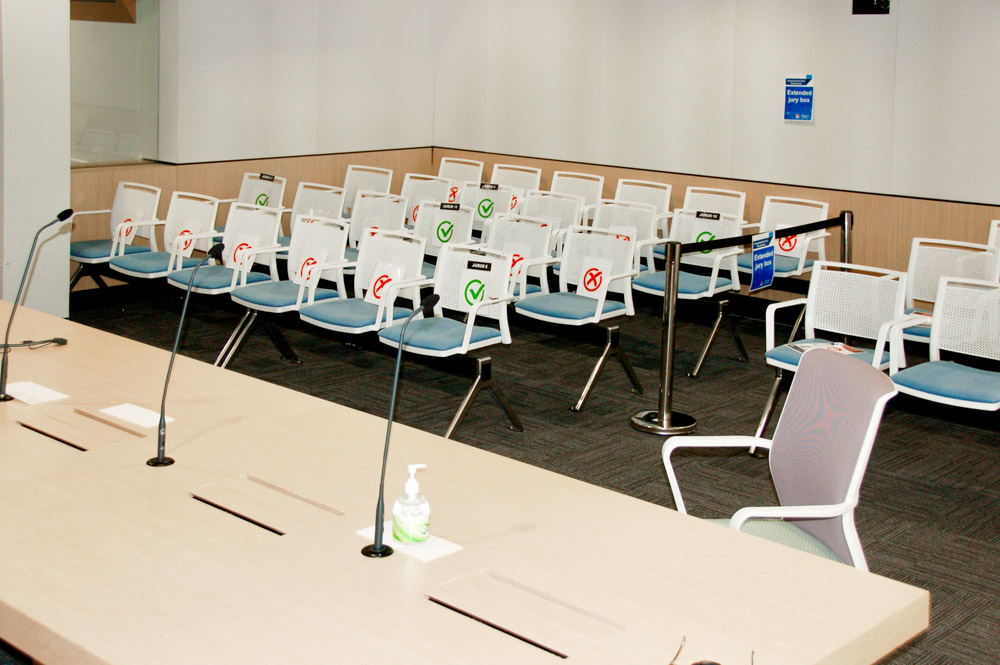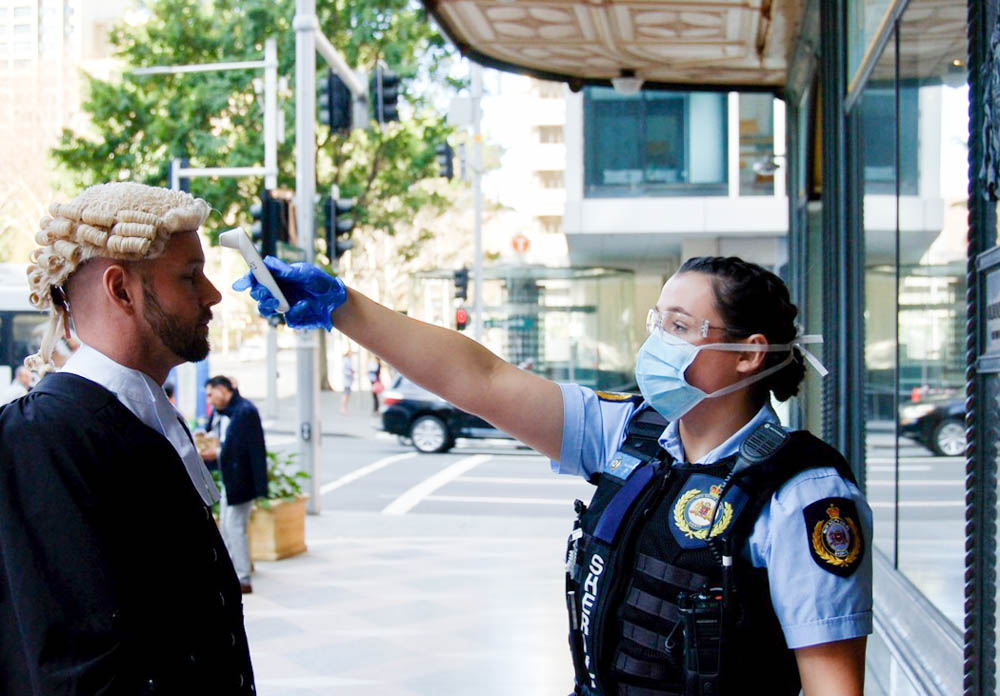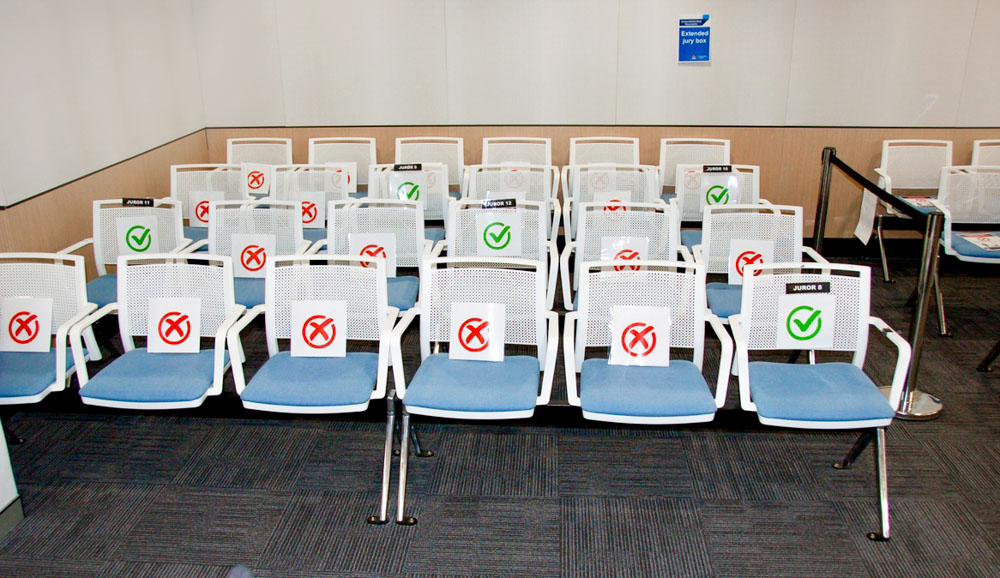COVID and Crime – A View from the Private Bar

Most barristers practising in criminal law do so 'at the coalface' – with advocacy inside the courtroom, witnesses who frequently include emergency services workers, and accused persons often in custody. Courthouses, emergency services and gaols were all critically impacted, in different ways, by the COVID-19 pandemic. This had a knock-on effect for private practitioners in criminal law, particularly those with 'back to back' trial practices.
Many private practitioners who specialise in criminal law have modest or low incomes comparative with other areas of the bar, being reliant on Legal Aid brief fees, or CDPP and NSW DPP rates. However, all are exposed to meeting the high overheads of chambers shared across the bar.

The impact of COVID-19 on those practising in criminal law – especially juniors – was immediate. With the necessary suspension of jury trials and cessation of most Local Court hearings, the impact was broad, and devastating for many. The initial shock felt may be encapsulated in the small snapshots overleaf, from barristers in the last week of March when the COVID curve was rising.
With the COVID curve levelling sooner than anticipated, although with continuing risk and health measures, many of those practices survived or are starting to slowly bounce back. Some individuals have coped by adjusting their priorities during the pandemic and accepting support from others. However, the pandemic continues to cause hardship and stress amongst the private criminal bar.

Impact upon the criminal justice system
In the upheaval immediately after the local outbreak of the pandemic, Hamill J was swift to observe that it created a challenge for the criminal justice and penal systems of a kind not experienced in recent decades, if ever, in Australian law.1 The months since have borne witness to his Honour’s remark.
In many respects, technological solutions were key and hold promise to be advantageous to practice. With operational technology, it is possible to appear in mentions in more than one court, over diverse distances in a single day where physical distance or prior insistence on physical appearance would have otherwise made this impossible. This also assists the continued participation of practitioners in high risk health categories. The efficiency of courts in particular aspects of the criminal law, such as mentions and lists, might be enhanced in the future by virtual appearances.
In the Supreme Court, bail matters and criminal appeals without witnesses are being conducted by virtual courtroom. In such matters for the main part, the change is that the practitioners moved to virtual appearance.
However, in a number of respects, despite the best will and perseverance from the courts, practitioners and parties during the pandemic, the criminal justice system has strained to provide features important to critical areas of criminal process.
Some hearings have taken longer, or significantly longer, due to connectivity and bandwidth issues. The District Court experienced a large increase in virtual traffic, contributing to difficulties, especially on list days. Participants in contested proceedings, from Crown prosecutors and solicitors to witnesses and accused persons, experienced repeated 'drop outs' and 'bump offs'. In one matter, counsel reported having to dial in over 11 times. Another counsel reported a sentence matter stretching from one to seven days. Superimposed challenges arise where interpreters are involved.2
Reports flowed in of appearances hampered by shifting, frozen or lost images on screens, audio distortion or audio loss and parts of submissions not transcribable. Patience and tenacity abounded. Upgrade after upgrade assisted. Matters continued where feasible without compromising fairness.
Early difficulties with technology in the Supreme Court criminal jurisdiction affected the progress of trials by judge alone. Fullerton J described the experience in her Honour’s decision adjourning the trial in R v Macdonald; R v Edward Obeid; R v Moses Obeid (No 11) [2020] NSWSC 382, and emphasised,
The accused are entitled to a fair trial which includes, necessarily, fair process and procedures. I am of the view that a trial of the accused in a virtual courtroom is impractical… the accused’s right to a fair trial would be at risk were I to order that it continue at this time, subject as it is to the current health and safety regime…
It is widely accepted that in criminal law, a virtual courtroom is particularly problematic where witnesses are giving evidence and being cross-examined on complex, sensitive and critical matters of
fact, and in which credit issues are central to proceedings. Apart from jury trials, this may include sentencing matters, trials by judge alone and fresh evidence appeals. Platforms currently used by many courts are designed for meetings, rather than the dynamic, often unpredictable and very different process of trial and complex sentencing proceedings. Visual obscurities and delays in transmission present difficulties in matters reliant upon the adducing of evidence in chief, effective cross-examination and assessment of demeanour. Ensuring the integrity of remote evidence, and managing how witnesses or persons in custody are shown exhibits or documents, within resourcing and practical limitations, raise further challenges.
Virtual appearance also raises the critical issue of how an accused in custody is to effectively give instructions. AVL suites in custody do not permit online communication. Either the courtroom must be emptied or the accused taken to a 'holding pen' with other prisoners for instructions to be taken, raising both confidentiality and safety issues. In one case during the pandemic, it was reported that an inmate was killed by another inmate in such a pen.
AVL suites frequently have poor noise insulation, with noise emanating from nearby suites where other inmates can be heard giving evidence or instructions. Some courts battled on, raising voices to be heard, others waited for quiet. Even if muted to the court, offenders may not be able to hear or fully participate in their own proceedings.
Resourcing is plainly critical. Many Local Courts do not have adequate AVL capacity or AVL at all. A large proportion of Local Court matters involve unrepresented litigants, who may not have the requisite access to technology.
The pandemic also presented unexpected quirks - the physical layout of older courthouses in some locations means that there is no option but for practitioners and the public to line up street-side outside court, to ensure social distancing.
Challenges of the multiplicity of demands during the pandemic, juggling home schooling of young children and appearing in court from home demanded flexibility. Unscheduled toddler appearances were met with smiles and swift removal from the virtual court.
Pandemic relief measures
Upon the outset of the pandemic, the Criminal Law Committee moved to introduce groups to enable communication and support between barristers within chambers and regionally. Senior barristers practising in criminal law and senior juniors mobilised to provide devilling work to juniors and readers. The Association successfully argued for the extension of 'JobKeeper' to sole traders. This saw barristers who had lined up with other impacted members of the community for 'JobSeeker' apply for 'JobKeeper'.
The CDPP and NSW DPP immediately committed to support the private bar by maintaining briefs with private practitioners, permitting preparation work for upcoming trials and undertaking to pay outstanding fees promptly.
The Commercial Law Section and taxation specialists published guidance and assistance particular to barristers which was welcomed by other sectors of the bar. The IT Committee consistently provided invaluable and urgent support for members. Individual chambers pursued rent relief with mixed success and some chambers were able to waive or defer rent obligations that could not be met. Overall, the story is one of great and continuing collegiality.
Criminal law barristers also jumped quickly into assisting community members impacted by COVID-19 through the provision of free legal advice and volunteering during the pandemic.
Looking forward
Courts are now moving cautiously towards re-opening, sooner than we might have anticipated when watching the tragedy of the pandemic in Italy, New York and the United Kingdom during March 2020. There are altered procedures for trials to accommodate safety measures. COVID-19 presents real and unchartered challenges to preserving the fundamental tenets of a fair trial in extraordinary circumstances. Barristers will need to be astute in the face of potential difficulties – all while welcoming a return to practising safely inside courthouses.
'the majority of work in my diary is gone'
'I had back to back trials listed, none of which will get on now'
'much of my practice has disappeared over the past week'
'I am sure that, for all intents and purposes, I have run out of work'
'almost all of my work has stopped'
'my practice has been decimated'
'My income will dry up in about 3-4 weeks'
'a significant portion of my practice is going to be wiped… I have five trials…which will all disappear…I had a few Local Court hearings which are disappearing too'
'my practice is now basically non-existent'


